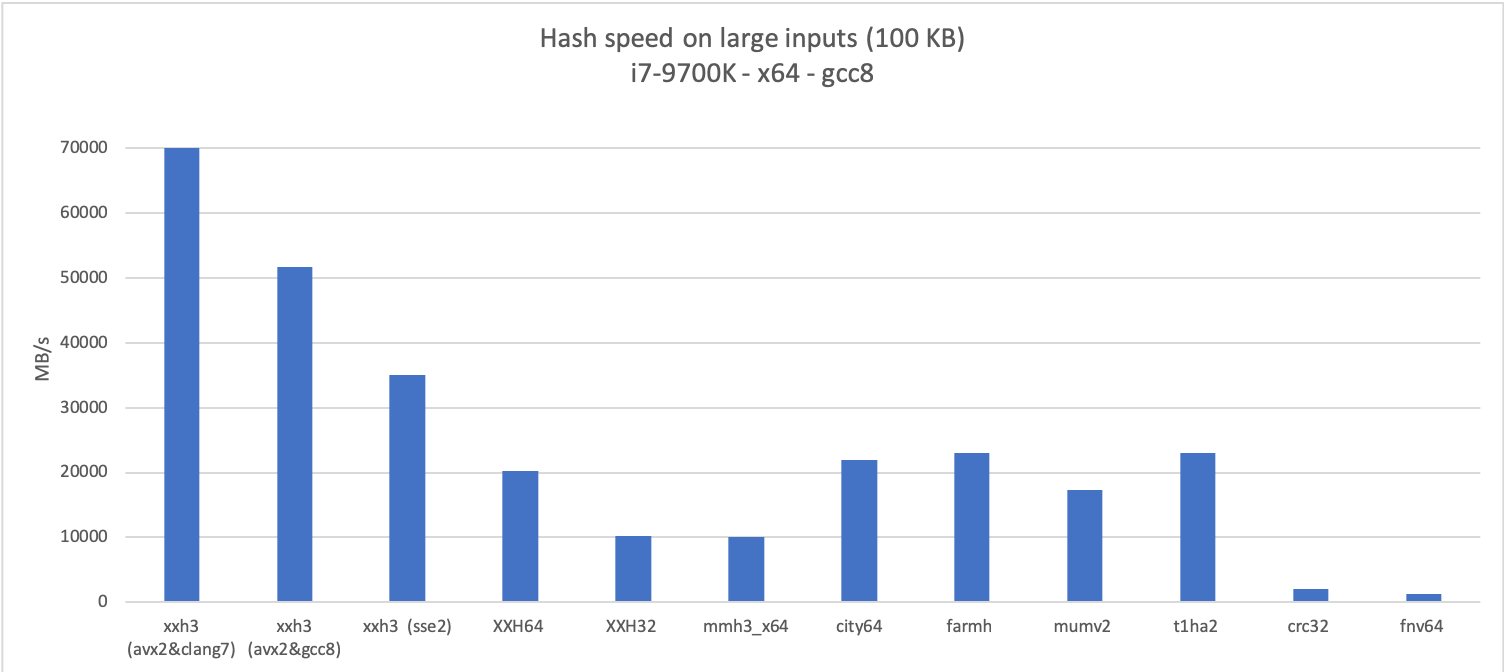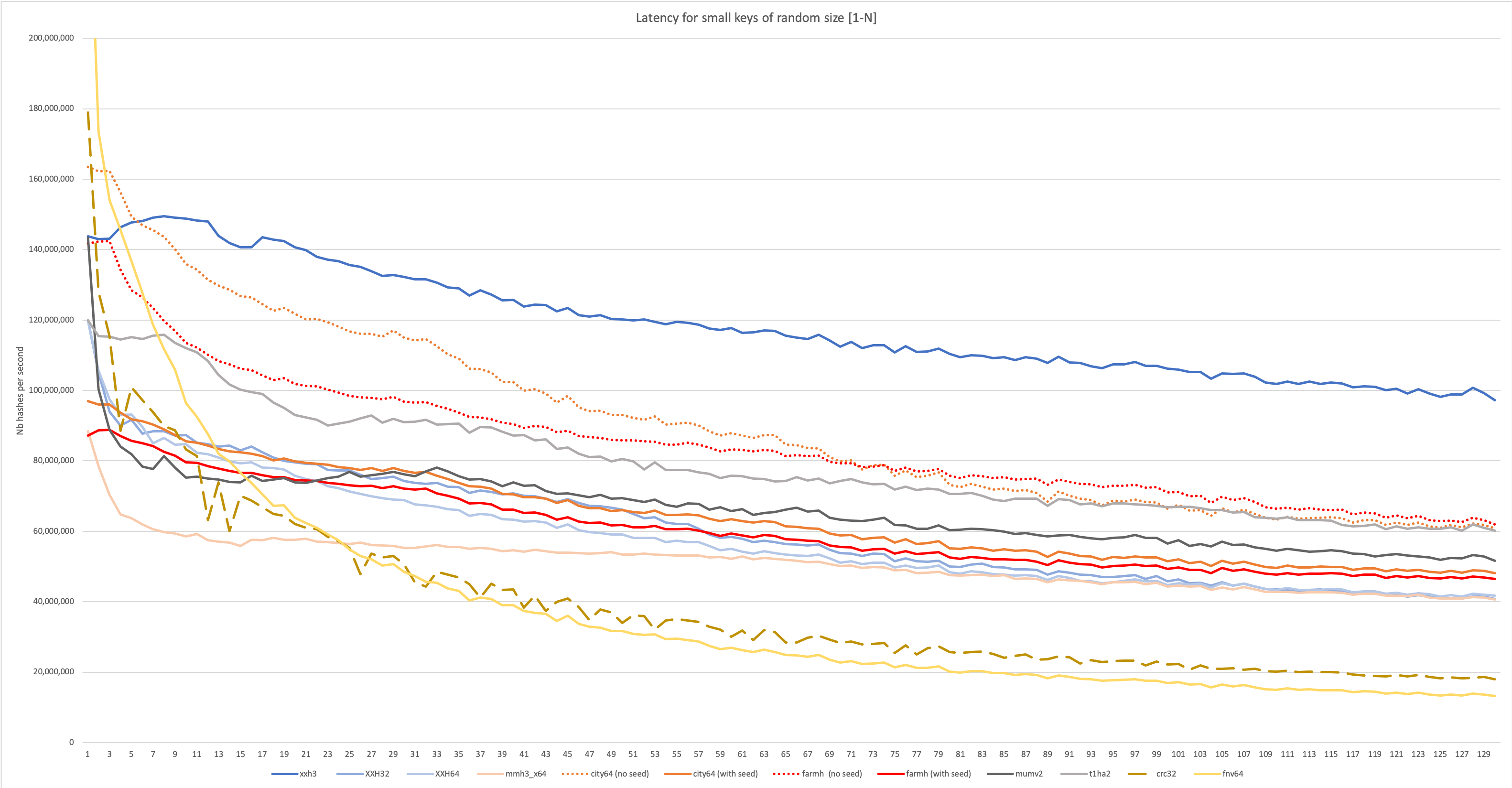Following comments from @koraa : - fix endianess issue, by using canonical representation - all segments are derived from first one, in order to reduce dependency chain - all derived segments use a seed, which is a combination raw custom seed content and segNb - updated documentation This variant breaks the possibility for an actor to derive the entire secret from the knowledge of one of its segments since it requires the seed, which is derived from original custom seed, which is not present anywhere, condensed in the scrambling operation. |
||
|---|---|---|
| cmake_unofficial | ||
| doc | ||
| tests | ||
| .gitattributes | ||
| .gitignore | ||
| .travis.yml | ||
| appveyor.yml | ||
| CHANGELOG | ||
| libxxhash.pc.in | ||
| LICENSE | ||
| Makefile | ||
| README.md | ||
| xxh3.h | ||
| xxhash.c | ||
| xxhash.h | ||
| xxhsum.1 | ||
| xxhsum.1.md | ||
| xxhsum.c | ||
xxHash - Extremely fast hash algorithm
xxHash is an Extremely fast Hash algorithm, running at RAM speed limits. It successfully completes the SMHasher test suite which evaluates collision, dispersion and randomness qualities of hash functions. Code is highly portable, and hashes are identical on all platforms (little / big endian).
| Branch | Status |
|---|---|
| master | |
| dev |
Benchmarks
The benchmark uses SMHasher speed test, compiled with Visual 2010 on a Windows Seven 32-bit box. The reference system uses a Core 2 Duo @3GHz
| Name | Speed | Quality | Author |
|---|---|---|---|
| xxHash | 5.4 GB/s | 10 | Y.C. |
| MurmurHash 3a | 2.7 GB/s | 10 | Austin Appleby |
| SBox | 1.4 GB/s | 9 | Bret Mulvey |
| Lookup3 | 1.2 GB/s | 9 | Bob Jenkins |
| CityHash64 | 1.05 GB/s | 10 | Pike & Alakuijala |
| FNV | 0.55 GB/s | 5 | Fowler, Noll, Vo |
| CRC32 | 0.43 GB/s † | 9 | |
| MD5-32 | 0.33 GB/s | 10 | Ronald L.Rivest |
| SHA1-32 | 0.28 GB/s | 10 |
Note †: SMHasher's CRC32 implementation is known to be slow. Faster implementations exist.
Q.Score is a measure of quality of the hash function. It depends on successfully passing SMHasher test set. 10 is a perfect score. Algorithms with a score < 5 are not listed on this table.
A more recent version, XXH64, has been created thanks to Mathias Westerdahl, which offers superior speed and dispersion for 64-bit systems. Note however that 32-bit applications will still run faster using the 32-bit version.
SMHasher speed test, compiled using GCC 4.8.2, on Linux Mint 64-bit. The reference system uses a Core i5-3340M @2.7GHz
| Version | Speed on 64-bit | Speed on 32-bit |
|---|---|---|
| XXH64 | 13.8 GB/s | 1.9 GB/s |
| XXH32 | 6.8 GB/s | 6.0 GB/s |
This project also includes a command line utility, named xxhsum, offering similar features to md5sum,
thanks to Takayuki Matsuoka's contributions.
License
The library files xxhash.c and xxhash.h are BSD licensed.
The utility xxhsum is GPL licensed.
New hash algorithms
Starting with v0.7.0, the library includes a new algorithm named XXH3,
which is able to generate 64 and 128-bit hashes.
The new algorithm is much faster than its predecessors for both long and small inputs, which can be observed in the following graphs:
To access these new prototypes, one needs to unlock their declaration, using the build macro XXH_STATIC_LINKING_ONLY.
The algorithm is currently in development, meaning its return values might still change in future versions. However, the API is stable, and can be used in production, typically for ephemeral data (produced and consumed in same session).
Since v0.7.3, XXH3 has reached "release candidate" status,
meaning that, if everything remains fine, its current format will be "frozen" and become the final one.
After which, return values of XXH3 and XXH128 will no longer change in future versions.
XXH3's return values will be officially finalized upon reaching v0.8.0.
Build modifiers
The following macros can be set at compilation time to modify libxxhash's behavior. They are all disabled by default.
XXH_INLINE_ALL: Make all functionsinline, with implementations being directly included withinxxhash.h. Inlining functions is beneficial for speed on small keys. It's extremely effective when key length is expressed as a compile time constant, with performance improvements observed in the +200% range . See this article for details.XXH_PRIVATE_API: same outcome asXXH_INLINE_ALL. Still available for legacy reasons. The different name underlines that XXH_* symbols will not be exported.XXH_NAMESPACE: Prefixes all symbols with the value ofXXH_NAMESPACE. This macro can only use compilable character set. Useful to evade symbol naming collisions, in case of multiple inclusions of xxHash's source code. Client applications still use the regular function name, as symbols are automatically translated throughxxhash.h.XXH_ACCEPT_NULL_INPUT_POINTER: if set to1, when input is aNULLpointer, xxHash'd result is the same as a zero-length input (instead of a dereference segfault). Adds one branch at the beginning of each hash.XXH_FORCE_MEMORY_ACCESS: The default method0uses a portablememcpy()notation. Method1uses a gcc-specificpackedattribute, which can provide better performance for some targets. Method2forces unaligned reads, which is not standards compliant, but might sometimes be the only way to extract better read performance. Method3uses a byteshift operation, which is best for old compilers which don't inlinememcpy()or big-endian systems without a byteswap instructionXXH_NO_PREFETCH: disable prefetching. XXH3 only.XXH_PREFETCH_DIST: select prefecting distance. XXH3 only.XXH_NO_INLINE_HINTS: By default, xxHash uses tricks like__attribute__((always_inline))and__forceinlineto try and improve performance at the cost of code size. Defining this to 1 will mark all internal functions asstatic, allowing the compiler to decide whether to inline a function or not. This is very useful when optimizing for the smallest binary size, and it is automatically defined when compiling with-O0,-Os,-Oz, or-fno-inlineon GCC and Clang. This may also increase performance depending on the compiler and the architecture.XXH_REROLL: Reduces the size of the generated code by not unrolling some loops. Impact on performance may vary, depending on the platform and the algorithm.XXH_STATIC_LINKING_ONLY: gives access to the state declaration for static allocation. Incompatible with dynamic linking, due to risks of ABI changes.XXH_NO_LONG_LONG: removes support for XXH3 and XXH64 for targets without 64-bit support.XXH_IMPORT: MSVC specific: should only be defined for dynamic linking, as it prevents linkage errors.XXH_CPU_LITTLE_ENDIAN: By default, endianess is determined at compile time, but if compiler cannot determine endianness, it becomes a runtime test. It's possible to skip auto-detection and force format to little-endian, by setting this macro to 1. Setting it to 0 forces big-endian.
Building xxHash - Using vcpkg
You can download and install xxHash using the vcpkg dependency manager:
git clone https://github.com/Microsoft/vcpkg.git
cd vcpkg
./bootstrap-vcpkg.sh
./vcpkg integrate install
./vcpkg install xxhash
The xxHash port in vcpkg is kept up to date by Microsoft team members and community contributors. If the version is out of date, please create an issue or pull request on the vcpkg repository.
Example
Calling xxhash 64-bit variant from a C program:
#include "xxhash.h"
(...)
XXH64_hash_t hash = XXH64(buffer, size, seed);
}
Using streaming variant is more involved, but makes it possible to provide data incrementally:
#include "stdlib.h" /* abort() */
#include "xxhash.h"
XXH64_hash_t calcul_hash_streaming(FileHandler fh)
{
/* create a hash state */
XXH64_state_t* const state = XXH64_createState();
if (state==NULL) abort();
size_t const bufferSize = SOME_SIZE;
void* const buffer = malloc(bufferSize);
if (buffer==NULL) abort();
/* Initialize state with selected seed */
XXH64_hash_t const seed = 0; /* or any other value */
if (XXH64_reset(state, seed) == XXH_ERROR) abort();
/* Feed the state with input data, any size, any number of times */
(...)
while ( /* any condition */ ) {
size_t const length = get_more_data(buffer, bufferSize, fh);
if (XXH64_update(state, buffer, length) == XXH_ERROR) abort();
(...)
}
(...)
/* Get the hash */
XXH64_hash_t const hash = XXH64_digest(state);
/* State can be re-used; in this example, it is simply freed */
free(buffer);
XXH64_freeState(state);
return hash;
}
Other programming languages
Aside from the C reference version, xxHash is also available in many different programming languages, thanks to many great contributors. They are listed here.
Branch Policy
- The "master" branch is considered stable, at all times.
- The "dev" branch is the one where all contributions must be merged before being promoted to master.
- If you plan to propose a patch, please commit into the "dev" branch, or its own feature branch. Direct commit to "master" are not permitted.

